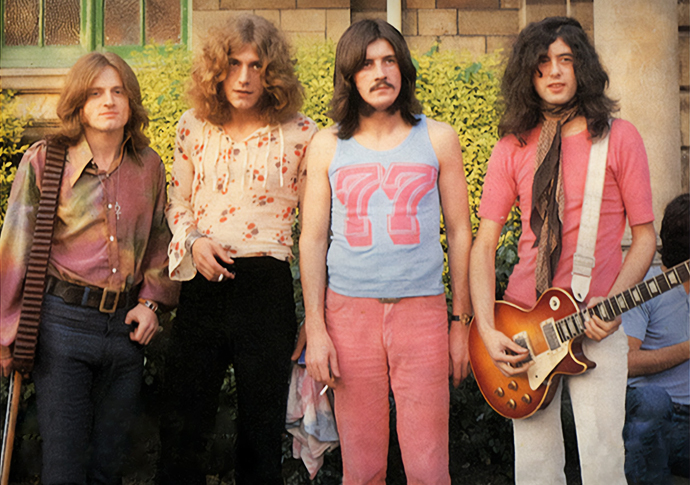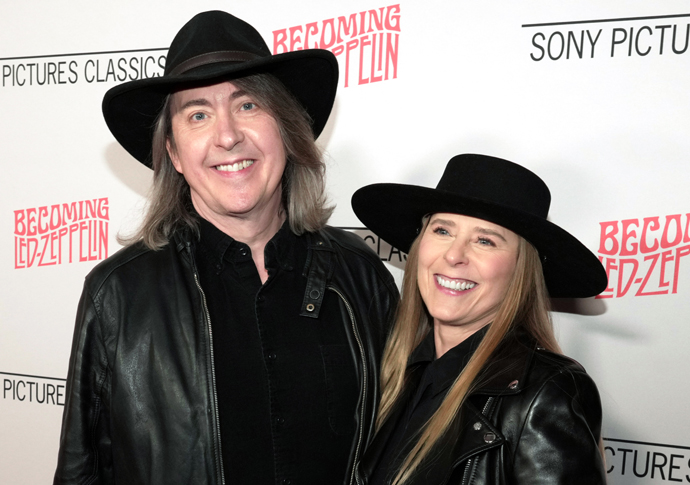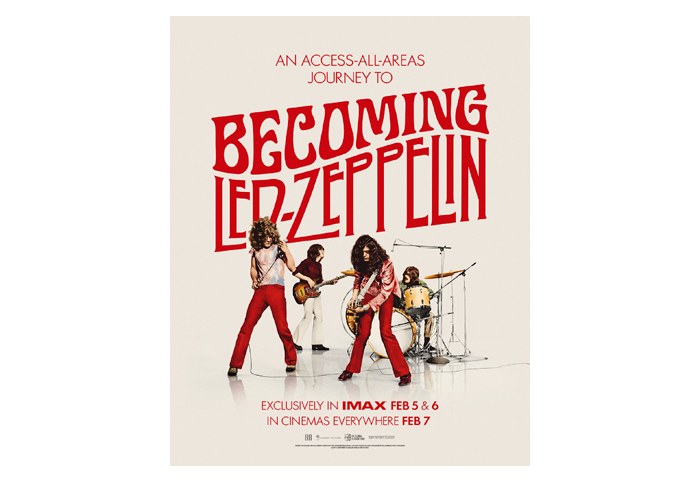‘They are the most misunderstood band in history’
The makers of a new documentary that charts the rise of Led Zeppelin had their mettle tested in order to get the band on board. Dan Carrier discovers how
Thursday, 13th March 2025 — By Dan Carrier

Led Zeppelin at the Bath International Music Festival in 1969 [2025ParadisePicturesLtd]
IT was down a set of steep stone stairs and through a tatty basement door that saw world-changing musical alchemy take place.
The address – 19 Gerrard Street, Soho – was the original home to Ronnie Scott’s jazz club: it had billiards tables and served tea to cabbies.
Nearly 10 years after Scott had squeezed a baby grand piano into the first incarnation of his club, four musicians would meet in that same basement, armed with a ceiling-high stack of amps, guitar, bass, drums and a microphone.
The quartet – Jimmy Page, Robert Plant, John Paul Jones and Robert Plant – gathered to embark on a new enterprise called Led Zeppelin, and would go on to conquer the world of rock and roll.
A new documentary, Becoming Led Zeppelin, in cinemas this week, charts the rise of the band.
Film-makers Bernard MacMahon and Allison McGourty had previously created the series American Epic, which saw the pair traverse the USA seeking out archive recordings of the roots of modern music, and chronicling the impact blues, folk, gospel and more from the turn of the 20th century onwards had on popular culture.
They have used the same approach to look at the origins of arguably the biggest rock and roll band the world has ever seen.
“It was in Gerrard Street where some real alchemy came together,” says Bernard.
That the film-makers chose Led Zep – and got the three surviving band members on board – was down to their previous work.
“We wanted to do a follow-up to American Epic and take a story from post World War Two to around 1970,” says Allison. Zep fitted the bill perfectly.
Bernard can clearly remember the first time he came across the band.
“My mother was an antique dealer and I remember, when I was aged 12, looking through a box of junk and in it was a paperback about Led Zeppelin.
“It was their story up to the early 1970s. It stuck with me and we thought – this could make the next part of American Epic.”
Led Zep’s development saw four boys growing up in a post-war Britain and finding themselves shaped and influenced by all forms of Americana.

Bernard MacMahon and Allison McGourty
“They took American music and then played it to Americans,” adds Allison.
Gaining access to the globally renowned musicians meant pitching a story that the band would agree to be told.
“We met with Jimmy Page and he had seen America Epic and had heard the soundtrack LPs – it opened the door” says Bernard.
On their first meeting, they walked the guitarist through how they felt the narrative would work. The conversation lasted seven hours.
“Jimmy threw in some questions to see if we were really as engaged as we said we were – thankfully, we had done our homework and knew the name, for example, of the obscure band Robert Plant was singing in before Zep,” says Bernard.
The answer is Obs Tweedle, for those who want to know.
As well as having singer Plant, guitarist Page and bass player John Paul Jones on board, they benefited from reams of previously unseen archive footage. The result has seen the film enjoy sell-out shows across the USA and has been given an extended run in the UK. Such is the sound and look of the band, the film is being screened on IMAX screens.
“For American Epic, we travelled to 38 different states to hunt down songs never heard and material long buried,” says Allison. “We did a similar job for Zep.”
What emerged was a story of a post-war generation who benefited from their parents living through the 1930s and the Second World War and saying: Never again.
“They were forged by the generation who had fought and won the war,” says Allison. “Their parents didn’t just save them from fascism – they built a better world, based on equality of access
“Bombs had fallen on Brixton and on Mayfair. Everyone had been in the same boat and the impact of the post-war movements for equality created the space for bands like Led Zeppelin to evolve and develop. It created new opportunities for working-class kids. All this music and culture came from that.”
The film takes the musicians’ back stories, describes how they met and then created the Zep sound.
“It is about four kids who were passionate about music and through hard and focused work, put themselves out there,” says Bernard.
John Paul Jones learned to play the organ at a church and then picked up the bass, encouraged by his father who had been in vaudeville acts.
Both he and Page made a living as session musicians before Zep.
“John Paul took himself down to Archer Street in Soho, where musicians were recruited, early each morning.
“Jimmy did the same. Robert also worked so hard in countless bands trying to make it. He’d been a beatnik , a mod, a hippie, a Midlands Tom Jones.
“They learned their craft and pushed barriers through striving.”
Jimmy had played on a series of well-known records as a session musician – and he used it as an education.
“Jimmy made it his business when he worked to learn what studio engineers were doing,” says Bernard.
The pair conducted 175 background interviews so when they arrived to talk to the three surviving members of Zep, they knew what they were talking about.
“The story was of course coloured by John Bonham’s early death in 1980, but we focused on the start of the band,” says Allison. “And they were really candid. They spoke to us as they would in private and were emotionally honest.”

Making the film, exploring how the members were inspired by American blues, skiffle and rock and roll created an origins story that explains the bands later success. And while later associated with rock and roll excess, Zep were at heart dedicated musicians.
“We fell in love with the music and felt they are the most misunderstood band in history,” says Bernard.
Watching early performances and seeing the band today react to what they produced shows how seminal their new take on old 12-bar blues was, they add.
“The songs have stood the test of time,” says Allison.
“We showed the film to some of the icons of the counterculture movement – [Blues guitarist] Taj Mahal, [author and director] Peter Coyote and Bob Weir from the Grateful Dead. Bob turned to me and said: They really were incredible musicians – they’re like a John Coltrane trio with a lead singer.”
• Becoming Led Zeppelin. Directed by Bernard MacMahon and written by Bernard MacMahon and Allison McGourty is in cinemas now.